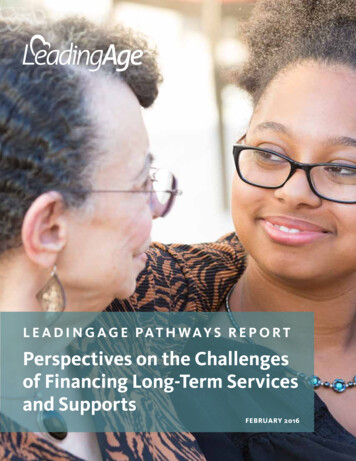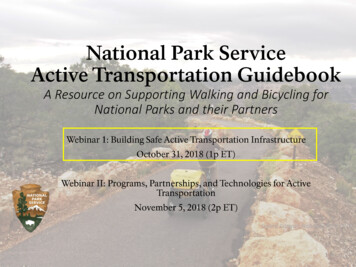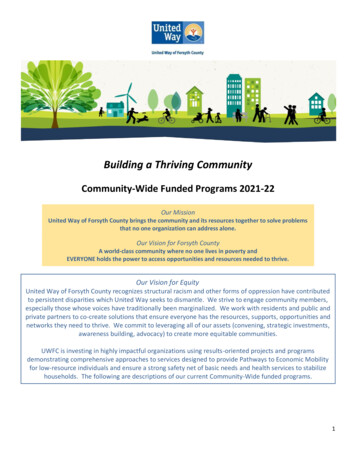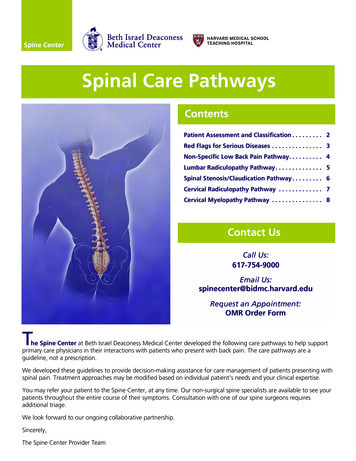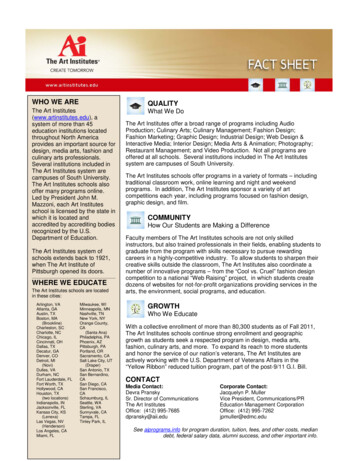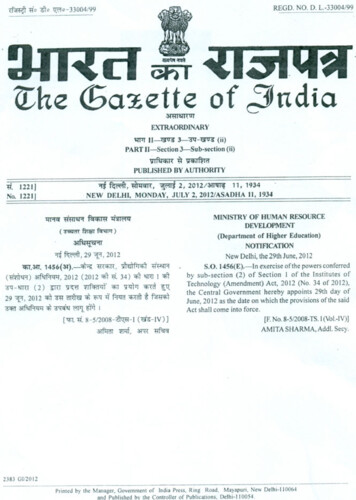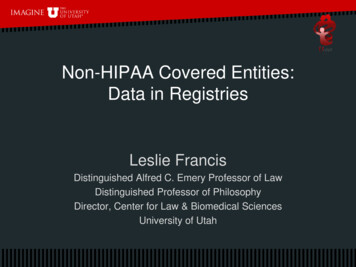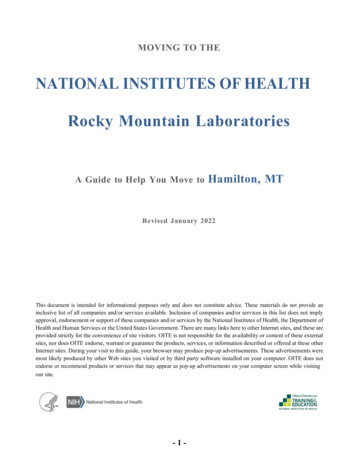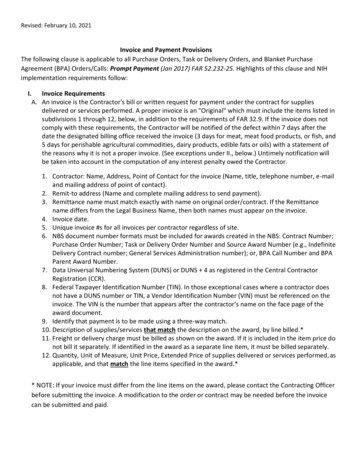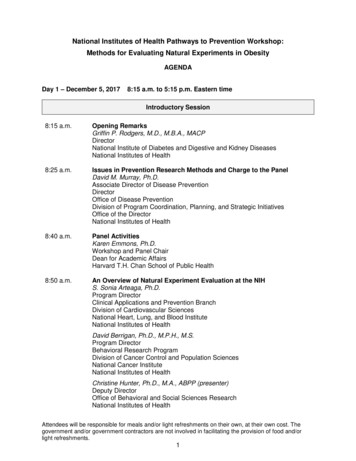
Transcription
National Institutes of Health Pathways to Prevention Workshop:Methods for Evaluating Natural Experiments in ObesityAGENDADay 1 – December 5, 20178:15 a.m. to 5:15 p.m. Eastern timeIntroductory Session8:15 a.m.Opening RemarksGriffin P. Rodgers, M.D., M.B.A., MACPDirectorNational Institute of Diabetes and Digestive and Kidney DiseasesNational Institutes of Health8:25 a.m.Issues in Prevention Research Methods and Charge to the PanelDavid M. Murray, Ph.D.Associate Director of Disease PreventionDirectorOffice of Disease PreventionDivision of Program Coordination, Planning, and Strategic InitiativesOffice of the DirectorNational Institutes of Health8:40 a.m.Panel ActivitiesKaren Emmons, Ph.D.Workshop and Panel ChairDean for Academic AffairsHarvard T.H. Chan School of Public Health8:50 a.m.An Overview of Natural Experiment Evaluation at the NIHS. Sonia Arteaga, Ph.D.Program DirectorClinical Applications and Prevention BranchDivision of Cardiovascular SciencesNational Heart, Lung, and Blood InstituteNational Institutes of HealthDavid Berrigan, Ph.D., M.P.H., M.S.Program DirectorBehavioral Research ProgramDivision of Cancer Control and Population SciencesNational Cancer InstituteNational Institutes of HealthChristine Hunter, Ph.D., M.A., ABPP (presenter)Deputy DirectorOffice of Behavioral and Social Sciences ResearchNational Institutes of HealthAttendees will be responsible for meals and/or light refreshments on their own, at their own cost. Thegovernment and/or government contractors are not involved in facilitating the provision of food and/orlight refreshments.1
Day 1 – December 5, 2017 (continued)Key Question 4:Which experimental and non-experimental methods have been used in studies of howprograms, policies, or built environment changes affect or are associated with obesityprevention and control outcomes?Key Question 5:What are the risks of bias in studies of how programs, policies, or built environment changesaffect or are associated with obesity prevention and control outcomes?9:05 a.m.Evidence-based Practice Center Presentation – Key Questions 4 and 5Emily A. Knapp, M.H.S.Doctoral CandidateJohns Hopkins Bloomberg School of Public HealthJohns Hopkins Evidence-based Practice CenterWendy L. Bennett, M.D., M.P.H.Associate ProfessorThe Johns Hopkins University School of MedicineJohns Hopkins Evidence-based Practice Center9:25 a.m.The Use of Quasi-Experimental Designs in Evaluating NaturalExperimentsThomas D. Cook, Ph.D.Joan and Serepta Harrison Emeritus Professor of Ethics and JusticeProfessor Emeritus of Sociology, Psychology, Education, and Social PolicyNorthwestern UniversityResearch ProfessorGeorge Washington Institute of Public PolicyTrachtenberg School of Public PolicyThe George Washington University9:45 a.m.When Is Correlation Causation?Jay Bhattacharya, M.D., Ph.D.Professor of MedicineCenter for Primary Care and Outcomes ResearchStanford University School of Medicine10:05 a.m.Break10:15 a.m.Natural Experiments and Obesity: Balancing Rigor With PracticalRealitiesTamara Dubowitz, Sc.D., M.Sc. S.M.FacultyPardee RAND Graduate SchoolSenior Policy ResearcherRAND CorporationAttendees will be responsible for meals and/or light refreshments on their own, at their own cost. Thegovernment and/or government contractors are not involved in facilitating the provision of food and/orlight refreshments.2
Day 1 – December 5, 2017 (continued)10:35 a.m.Discussion11:10 a.m.Lunch and Poster SessionKey Question 3:What obesity measures, dietary and physical behaviors, and other outcomes have beenassessed in studies of how programs, policies, or built environment changes affect or areassociated with obesity prevention and control?12:30 p.m.Evidence-based Practice Center Presentation – Key Question 3Eva Tseng, M.D., M.P.H.Assistant ProfessorThe Johns Hopkins University School of MedicineJohns Hopkins Evidence-based Practice Center12:50 p.m.Measures of Exposure to Policy and EnvironmentJamie F. Chriqui, Ph.D., M.H.S.Professor and Director–M.P.H. ProgramDivision of Health Policy and AdministrationCo-Director, Health Policy Center and FellowInstitute for Health Research and PolicyUniversity of Illinois at Chicago School of Public HealthMeasures of Co-Benefits: Considerations Based on Research Questionand PopulationJames F. Sallis, Ph.D.Professorial FellowInstitute for Health and AgeingAustralian Catholic University, MelbourneDistinguished Professor EmeritusDepartment of Family Medicine and Public HealthUniversity of California, San Diego1:20 p.m.Assessing Community Programs, Policies, and Practices Related toObesity PreventionLorrene Ritchie, Ph.D., R.D.DirectorNutrition Policy InstituteCooperative Extension SpecialistDivision of Agriculture and Natural ResourcesUniversity of California, BerkeleyAttendees will be responsible for meals and/or light refreshments on their own, at their own cost. Thegovernment and/or government contractors are not involved in facilitating the provision of food and/orlight refreshments.3
Day 1 – December 5, 2017 (continued)1:40 p.m.Collecting Diet, Activity, and Obesity Measures in Communities:Lessons LearnedChristina D. Economos, Ph.D.ProfessorNew Balance Chair in Childhood NutritionFriedman School of Nutrition Science and PolicyTufts University Medical School2:00 p.m.Discussion2:45 p.m.BreakKey Question 1:What population-based data sources have been used in studies of how programs, policies, orbuilt environment changes affect or are associated with obesity prevention and controloutcomes?2:55 p.m.Evidence-based Practice Center Presentation – Key Question 1Hadi Kharrazi, M.D., Ph.D., M.H.I.Assistant ProfessorDepartment of Health Policy ManagementJohns Hopkins Bloomberg School of Public HealthJohns Hopkins Evidence-based Practice Center3:15 p.m.Challenges and Opportunities in Using and Sharing Existing DataResourcesChristopher L. Fulcher, Ph.D.DirectorCenter for Applied Research and Engagement SystemsUniversity of Missouri3:35 p.m.Integration of Spatial and Other Data via the Private Sector, CrowdSourcing, and Open-Data InitiativesAndrew Turner, M.S.Director and Chief Technology OfficerResearch and Development Center, DCEnvironmental Systems Research Institute3:55 p.m.Opportunities To Fill the Data GapsShari L. Barkin, M.D., M.S.H.S.William K. Warren Foundation Endowed ChairProfessor of PediatricsDivision Chief of General PediatricsDirector of Pediatric Obesity ResearchVanderbilt University School of MedicineAttendees will be responsible for meals and/or light refreshments on their own, at their own cost. Thegovernment and/or government contractors are not involved in facilitating the provision of food and/orlight refreshments.4
Day 1 – December 5, 2017 (continued)4:15 p.m.Using Electronic Health Record Tools To Collect, Summarize, and TakeAction on Patients’ Social Determinants of Health Data, in the Contextof Diabetes Care: Lessons and ChallengesRachel Gold, Ph.D., M.P.H.Lead Research ScientistOCHIN, Inc.InvestigatorCenter for Health ResearchKaiser Permanente Northwest Center for Health Research4:35 p.m.Discussion5:15 p.m.AdjournAttendees will be responsible for meals and/or light refreshments on their own, at their own cost. Thegovernment and/or government contractors are not involved in facilitating the provision of food and/orlight refreshments.5
Day 2 – December 6, 2017 8:15 a.m. to 1:20 p.m. Eastern timeIntroductory Overview8:15 a.m.Workshop OverviewKaren Emmons, Ph.D.Workshop and Panel ChairDean for Academic AffairsHarvard T.H. Chan School of Public HealthKey Question 2:What methods have been used to link different population-based data sources?8:30 a.m.Evidence-based Practice Center Presentation – Key Question 2Wendy L. Bennett, M.D., M.P.H.Associate ProfessorThe Johns Hopkins University School of MedicineJohns Hopkins Evidence-based Practice Center8:50 a.m.Linking Health System, Environmental, and Contextual Data forEvaluation of Natural Experiments: Lessons LearnedStephen P. Fortmann, M.D.Emeritus FacultyStanford University School of MedicineAffiliate ProfessorOregon Health & Science UniversitySenior InvestigatorAssistant Program DirectorMedical DirectorKaiser Permanente Northwest9:05 a.m.Linking Economic and Behavioral Data for Evaluation of Policy andRetail EnvironmentsLisa M. Powell, Ph.D.Distinguished Professor and DirectorDivision of Health Policy and AdministrationUniversity of Illinois at Chicago School of Public Health9:20 a.m.Linking Environmental and Health Data: National and InternationalExamples and ChallengesMichael Jerrett, Ph.D., M.A.Professor and ChairDepartment of Environmental Health SciencesDirectorCenter for Occupational and Environmental HealthFielding School of Public HealthUniversity of California, Los AngelesDay 2 – December 6, 2017 (continued)Attendees will be responsible for meals and/or light refreshments on their own, at their own cost. Thegovernment and/or government contractors are not involved in facilitating the provision of food and/orlight refreshments.6
9:35 a.m.Discussion10:05 a.m.BreakKey Question 6:What methodological/analytic advances (e.g., data system features, approaches to linkingdata sources, or analytic methods) would help to strengthen efforts to estimate the effect ofprograms, policies, or built environment changes on obesity prevention and control?10:15 a.m.Evidence-based Practice Center Presentation – Key Question 6Lawrence J. Cheskin, M.D., FACP, FTOSDirector of Clinical ResearchAssociate ProfessorDepartments of Health, Behavior and Society, and International HealthJohns Hopkins Bloomberg School of Public HealthJohns Hopkins Evidence-based Practice Center10:35 a.m.Complex Systems Modeling and Simulation: Examining NaturalExperiment Processes and Understanding the Effects of ComplexInterventionsRoss A. Hammond, Ph.D.Senior Fellow, Economic StudiesDirectorCenter on Social Dynamics and PolicyEconomic Studies DepartmentThe Brookings Institution10:55 a.m.Novel Strategies for Estimating Effects of Natural ExperimentsSanjay Basu, M.D., Ph.D.Assistant Professor of MedicineStanford University11:15 a.m.Discussion12:00 NoonBreakTranslating Research to Policy and Practice12:10 p.m.Effectiveness, Costs, and Cost-Effectiveness: Improving Translationof Research to Policy and PracticeSteven L. Gortmaker, Ph.D.Professor of the Practice of Health SociologyDepartment of Social and Behavioral SciencesHarvard T.H. Chan School of Public HealthAttendees will be responsible for meals and/or light refreshments on their own, at their own cost. Thegovernment and/or government contractors are not involved in facilitating the provision of food and/orlight refreshments.7
Day 2 – December 6, 2017 (continued)12:25 p.m.Panel Discussion on Perspectives From the Field—Evidence Needsfor Policymakers and ImplementersRachel Ballard, M.D., M.P.H. (Moderator)Director of Prevention Research CoordinationOffice of Disease PreventionDivision of Program Coordination, Planning, and Strategic InitiativesOffice of the DirectorNational Institutes of HealthRobin McKinnon, Ph.D., M.P.A.Senior Advisor for Nutrition PolicyCenter for Food Safety and Applied NutritionOffice of Foods and Veterinary MedicineU.S. Food and Drug AdministrationAdetokunbo “Toks” Omishakin, M.U.R.P.Deputy Commissioner/ChiefEnvironment and Planning DivisionTennessee Department of TransportationGlenn E. Schneider, M.P.H.Chief Program OfficerThe Horizon Foundation of Howard County, Inc.1:10 p.m.NIH Leadership Wrap-UpGary H. Gibbons, M.D.DirectorNational Heart, Lung, and Blood InstituteNational Institutes of Health1:20 p.m.AdjournAttendees will be responsible for meals and/or light refreshments on their own, at their own cost. Thegovernment and/or government contractors are not involved in facilitating the provision of food and/orlight refreshments.8
Johns Hopkins Bloomberg School of Public Health Johns Hopkins Evidence-based Practice Center Wendy L. Bennett, M.D., M.P.H. Associate Professor The Johns Hopkins University School of Medicine Johns Hopkins Evidence-based Practice Center 9:25 a.m. The Use of Quasi-Experimental Designs in Evaluating Natural Experiments Thomas D. Cook, Ph.D.

